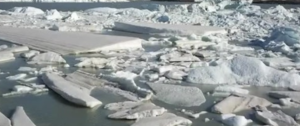Meanwhile On The Climate Beat: Greenland Lost 600 Billion Tons of Ice Last Year

Greenland lost so much ice last summer, it actually raised global sea levels. Here’s why that’s a huge problem.
After an unusually warm summer, Greenland’s ice sheet has lost 600 billion tons of ice, according to recently released NASA data.
The ice sheet lost a record amount of ice in 2012, and 2019’s recorded loss is a close second. The mass of ice lost by Greenland alone is enough to raise global sea levels 2.2 millimeters, according to the study published by American Geophysical Union in the Geophysical Research Letters.
“We expect more warm events like the one of 2019 (and 2012) in the future; this is a signature of the rapidly changing climate in the Arctic,” said lead author Isabella Velicogna, an Earth science professor at the University of California at Irvine and a senior scientist at NASA’s Jet Propulsion Laboratory.
According to NASA, melting from the Greenland ice sheet means more global flooding events. This is no different.
Greenland's contribution to sea-level rise is currently tracking what had been regarded as a pessimistic projection of the future, according to a study published in Nature in December. As the BBC put it, “it means an additional 7 cm of ocean rise could now be expected by the end of the century from Greenland alone. This threatens to put many millions more people in low-lying coastal regions at risk of flooding.”
This loss itself is also particularly significant. “The 2019 mass loss illustrates that melting of ice in Greenland is not proceeding at a steady state but includes a lot of variability,” Velicogna explained.
Weather data indicates that 2017 and 2018 were relatively cold years, which could suggest a pause in melt. But 2019 was an extremely warm year. So while some years experienced less melting than the average, some experienced significantly more.
“So if you take the average over the last four to five years, you realize there is no such thing as a pause, the melting exhibits high variability but remains on the rise,” Velicogna analyzed.
It’s difficult to specifically project extreme weather events in advance. But given global climate data, it is reasonable to expect more extreme weather, including extreme warming events like 2019.
Robin Bell, an expert on ice sheet dynamics at Columbia University who was not involved in the study, told The Washington Post that the study is valuable for researchers seeking to narrow their estimates of future sea-level rise.
“This is a beautiful update of how we can really see how the ice sheets are changing … from the annual inhale and exhale as the snow accumulates in the winter in Greenland and melts in the summer,” she said.
